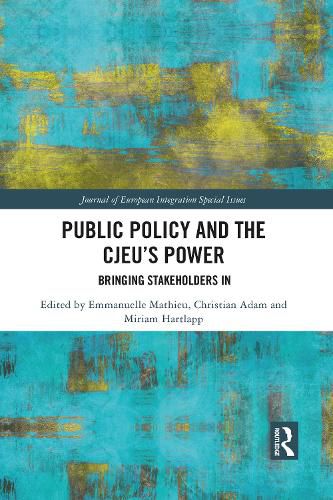Readings Newsletter
Become a Readings Member to make your shopping experience even easier.
Sign in or sign up for free!
You’re not far away from qualifying for FREE standard shipping within Australia
You’ve qualified for FREE standard shipping within Australia
The cart is loading…






Public Policy and the CJEU’s Power offers an overarching analytical framework for thinking about the impact of policy contexts on the CJEU’s influence on European public policy and the course of European integration. Thereby, it lays out a research agenda that is best described as public policy approach to studying judicial power in the European Union.
The policy contexts within which actors operate do not only structure the incentives to use litigation, they also affect how strongly the implementation of court rulings relies on these policy stakeholders. Therefore, the CJEU’s power is strongly dependent on policy contexts and policy stakeholders. This argument is illustrated by a wide variety of empirical analyses covering the three major types of legal actions before the CJEU (infringement proceedings, preliminary rulings and annulments), a wide variety of policy fields (e.g. competition law, internal market regulation, common agriculture policy, social policies, foreign policy), and different types of policy stakeholders (e.g. public, private, subnational, national and European stakeholders). Using this rich empirical material, the book provides an analytic framework for thinking about how policy contexts influence the CJEU’s impact.
Bringing together expert contributions, Public Policy and the CJEU’s Power will be of great interest and use to scholars working on the European Union, law and politics and public policy. The chapters were originally published as a special issue in the Journal of European Integration.
$9.00 standard shipping within Australia
FREE standard shipping within Australia for orders over $100.00
Express & International shipping calculated at checkout
Public Policy and the CJEU’s Power offers an overarching analytical framework for thinking about the impact of policy contexts on the CJEU’s influence on European public policy and the course of European integration. Thereby, it lays out a research agenda that is best described as public policy approach to studying judicial power in the European Union.
The policy contexts within which actors operate do not only structure the incentives to use litigation, they also affect how strongly the implementation of court rulings relies on these policy stakeholders. Therefore, the CJEU’s power is strongly dependent on policy contexts and policy stakeholders. This argument is illustrated by a wide variety of empirical analyses covering the three major types of legal actions before the CJEU (infringement proceedings, preliminary rulings and annulments), a wide variety of policy fields (e.g. competition law, internal market regulation, common agriculture policy, social policies, foreign policy), and different types of policy stakeholders (e.g. public, private, subnational, national and European stakeholders). Using this rich empirical material, the book provides an analytic framework for thinking about how policy contexts influence the CJEU’s impact.
Bringing together expert contributions, Public Policy and the CJEU’s Power will be of great interest and use to scholars working on the European Union, law and politics and public policy. The chapters were originally published as a special issue in the Journal of European Integration.